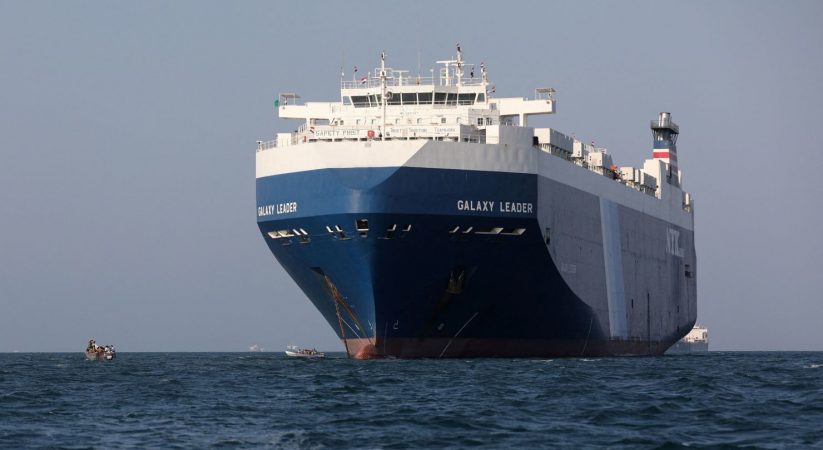
Terrorism, militancy and pirates: Gulf of Aden hijacking underlines naval challenges
It was like a scene from a movie. A navy helicopter launches from a warship and flies towards a merchant ship that pirates have taken over. A group of elite marine commandos board a fast motorboat and head off in the direction of the seized vessel. As the boat closes in on the merchant vessel, the warship issues an ultimatum to the pirates: Surrender or face dire consequences. Not far away, pirates on the merchant vessel push to break into a safe house where the ship’s crew has taken refuge. Inside, the mood is tense. Weary crew members look desperate and resigned to their fate. An agonising hour later, naval commandos begin boarding the merchant vessel. The helicopter is soon hovering over the ship. The pirates realise their game is up. With the commandoes dangerously close, the bandits make their escape.
It all happened in the waters of Somalia on January 5. The MV Lila Norfolk, a bulk carrier sailing under the Liberian flag, was en route from Brazil to Bahrain when it was hijacked about 850 km east off Africa’s coast. As the pirates approached the ship, the crew alerted the United Kingdom Maritime Trade Operations — a Royal Navy channel that serves as a conduit between merchant ships and military ships — of its imminent hijacking. Within minutes of the message appearing on the UKMTO portal, the Indian Navy sprang into action and diverted the INS Chennai, a guided missile destroyer, from its anti-piracy patrol to the site of the hijacking in the Gulf of Aden. The Navy also deployed a P-8I maritime patrol aircraft and an MQ-9B drone to monitor the operation and send in live footage. Within hours of the incident being reported, the Indian Navy’s marine commandoes boarded the Lila Norfork and rescued all 21 crew members, including 15 Indians.
The operation, live-streamed from a drone, is making waves on social media. The Indian Navy has received deserved praise for its prompt and effective response. The operation was, indeed, a self-assured demonstration of capability and resolve to deliver security in the face of adversity. Nonetheless, the resurgence of piracy has placed India and other regional states under immense strain. The attempted takeover of Lila Norfork is only the latest in a series of pirate hijackings since November 2023. In the past six weeks, attacks on merchant ships have become increasingly common, and regional navies are struggling to keep up.
Theories abound about why piracy in the western Indian Ocean is witnessing a surge. One explanation is that the pirates are taking advantage of the security shift from the Gulf of Aden to the Red Sea. Notwithstanding the successes of the past decade, observers say anti-piracy operations have failed to decisively address Somalia’s piracy problem. In recent years, international maritime presence in the Gulf of Aden has progressively fallen, shifting the security burden to a select few navies. Following the termination of NATO’s anti-piracy mission in 2016, the onus of security in the Gulf of Aden has fallen on the US-led coalition, some EU maritime forces, and independent actors such as the Indian Navy and the Chinese Navy. Yet, as international focus has shifted to the Red Sea, the mission in the waters of Somalia has been increasingly hard to accomplish — not only due to a lack of capacity but also because regional navies in recent years have tended to regard anti-piracy operations as a bare-bones act required to reassure international shippers. The growing frequency of attacks in the Gulf of Aden has called into question their assumption that piracy in Somali waters stands eradicated and is unlikely to recur.
The other theory is that the pirates and the militants are acting in concert. The proponents of this line of reasoning cite intelligence that suggests Al-Shabaab in Somalia joined hands with the Houthis in the Red Sea. Both groups reportedly have sympathies with Hamas, with whom Israel is engaged in a conflict. Although outwardly compelling, there is scant evidence to support this contention.
A third perspective links piracy with power rivalries in the Horn of Africa. By some accounts, there is a connection between rising pirate attacks and a recent agreement signed between Ethiopia and Somaliland, a breakaway province of Somalia that declared independence from the country in 1991. The pact offers land-locked Ethiopia access to the sea in return for the country’s recognition of Somaliland as an independent state. The Al-Shabaab — a terrorist group that controls vast parts of Somalia — opposes the pact. Recently, it threatened Ethiopia and Somaliland, calling for jihad attacks against the two countries. The increase in pirate attacks, some say, is a possible attempt by Al-Shabaab to highlight its disruptive potential to European states that are inclined to recognise Somaliland, as well as to dissuade the UAE and Saudi Arabia from investing in Somaliland’s ports. It is no coincidence that pirate hijackings have occurred across the water from Somaliland, which has never been a serious hotbed for pirates — a seeming plot by the terrorist group to undermine the breakaway province’s ability for self-governance and maritime law enforcement.
It merits mentioning that the socioeconomic realities that underpin Somali piracy remain. Research shows that international fishing vessels continue to illegally exploit fish off Somalia’s coastline. Foreign fishing vessels still harvest tuna stocks in Somali waters, leaving little for coastal fishing communities. The revival of piracy could well be chalked down to the fact that when people have little, crime is the only way. That does not detract from the complexity of piracy or the reality that no theory fully captures its essence. Whatever the real reasons behind the recent spurt in attacks, shipping companies, and regional navies must brace for tough times ahead.
.
Sources: The Indian Epress | Written by Abhijit Singh | The writer is Head of the Maritime Policy Initiative at ORF.
.
_____________________________________________________________________________________Xafiiska Wararka Qaranimo Online | Mogadishu, Somalia
_____________________________________________________________________________________Advertisement
_____________________________________________________________________________________







